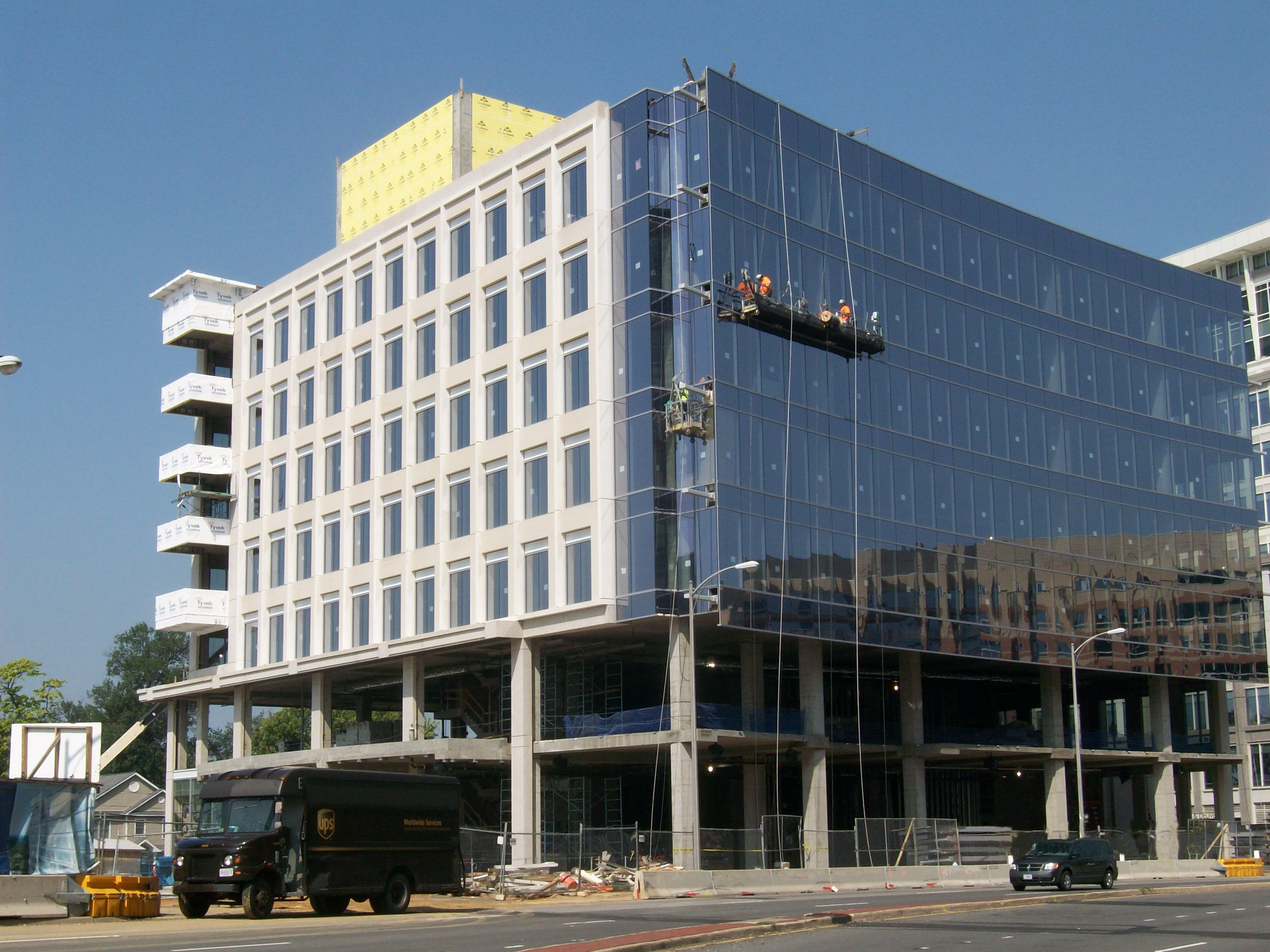Virginia Tech Research Center -- Arlington to open next summer; seven-story LEED-certified building designed to foster research and collaboration

The Virginia Tech Research Center – Arlington is on target to open its doors at 900 N. Glebe Road in summer 2011. The highly visible, state-of-the-art facility will further the university's mission to expand its research portfolio in a region that offers great opportunity for partnerships with corporate research entities and close proximity to government agencies and other public and private-sector organizations.
“Located in the vibrant Ballston district of Arlington, the center is only a short distance from many of the leading science and research agencies of our federal government and many high-technology companies. It provides us with a unique opportunity to strengthen and expand the many relationships we already have with the public and private-sector scientific community in the National Capital Region,” said Virginia Tech President Charles W. Steger. “As we continue our work as one of the nation’s leading research universities, we would be hard pressed to find a better location to consolidate and grow Virginia Tech’s local research activities.”
The new research center is part of a larger JBG Companies' development project in Ballston, conveniently located a few blocks from the Metro and two blocks off Route 66.
The seven-floor, 144,000-square-foot Virginia Tech Research Center – Arlington is U.S. Green Council LEED-certified. The exterior of the building, designed by Cooper Carry, features first floor amenities which include retail, exhibits, an outdoor terrace restaurant and abundant green space. The interior, designed by Gensler, will include computational laboratories, offices, and a conference center to accommodate meetings, forums, symposia, and other events. According to Jim Bohland, vice president and director of National Capital Region Operations, the conference center will also be available to the science and technology communities throughout the region for meetings and events not specifically related to the university.
Bohland also said that two of the seven floors in the building not occupied by Virginia Tech will be available for commercial lease.
The building will incorporate next-generation Internet with direct fiber access to National LambdaRail, Internet 2, and multiple federal networks. High-performance connectivity will link this research center to Virginia Tech, Blacksburg, and other major universities. There will also be access to international peering points in New York, Chicago, Seattle, Los Angeles, and Florida, and it will provide a secure data center for high performance computing (HPC)-based research.
“Virginia Tech's new center in Arlington will be among the best connected research facilities in the world, literally at the nexus of national high performance research and commercial networks,” said Erv Blythe, vice president, Information Technology, Virginia Tech.
The conference center will consist of a tiered-seating executive lecture hall, a large, divisible multipurpose room, break-out session rooms, business center, and a demonstration/visualization room with a 20-foot ultra-high-resolution projection screen that allows all manner of information to be visually presented in size, detail, and resolution that fosters the best of collaborative breakthroughs for scientists, researchers, intelligence analysts, and military command and control teams. Integrated catering capabilities will also be available.
A number of already established Virginia Tech research centers and institutes, located throughout the northern Virginia area, will move to the new facility. When it opens next summer, the center is expected to house the Advanced Research Institute, Virginia Bioinformatics Institute, Institute for Critical Technology and Applied Science, Arlington Innovation Center for Health Research, and the Institute for Society, Culture, and Environment.
“A signature research building for Virginia Tech in the National Capital Region builds credibility among our sponsors, showing that we provide a local resource where we can demonstrate advanced applications of our research and discovery,” said Saifur Rahman, director of the Advanced Research Institute. “In relocating to the new building, the institute expects to continue and expand its core research activities in the areas of energy and the environment, bio-informatics, critical infrastructure protection, information security assurance and cyber physical systems.”
The Virginia Tech Research Center – Arlington is supported by the Virginia Tech Foundation which has developed other Virginia Tech facilities in the National Capital Region, the Marion duPont Scott Equine Medical Center in Leesburg and the Washington Alexandria Architecture Center in Alexandria.
Related Links
- Virginia Bioinformatics Institute conference addresses issues of socially coupled systems and informatics in time of increasingly critical interdependencies
- AIC-HR organizes Workshop on Medical Home to focus on new primary care delivery system
- Virginia Tech, IBM to partner with Arlington County on emergency system informatics initiative
- University announces plan to build research center in Ballston; completion due in late 2010




